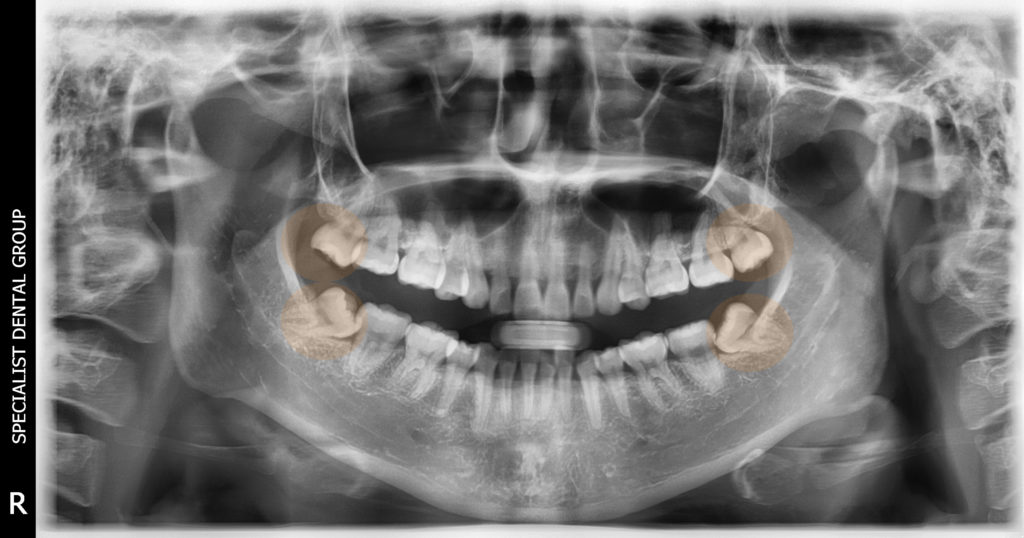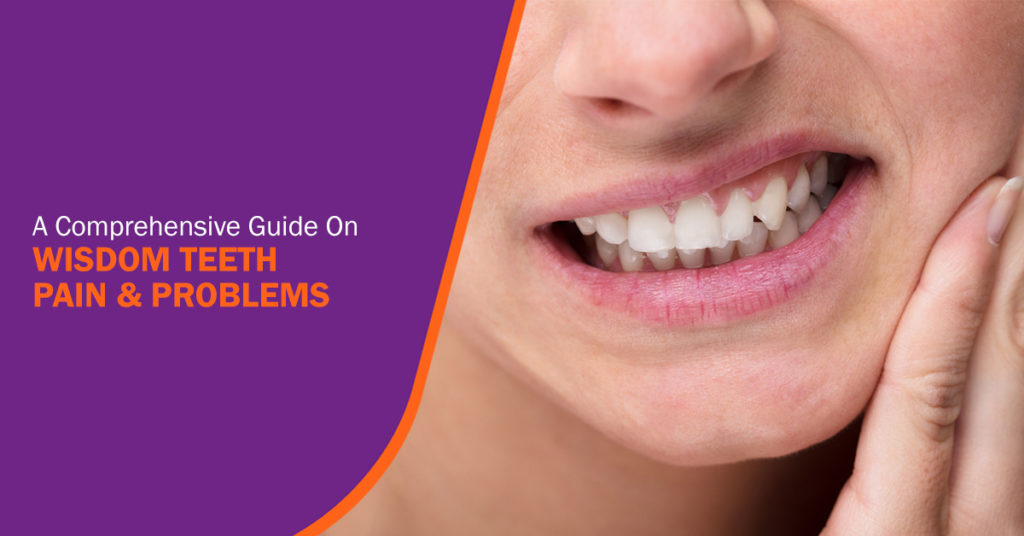Wisdom teeth are the last permanent teeth (third molars) to erupt into the mouth, and this usually takes place between the ages of 17 and 25 (the ages of wisdom, hence the term wisdom teeth). They are found at the very back of your mouth, with two on the upper jaw and another on the lower jaw, forming a complete set of 32 permanent teeth.
You can use wisdom teeth that erupt correctly to chew food. However, most people do not have enough space in their jaw for wisdom teeth to come through, causing problems along the way. This blog post answers some of the most commonly asked questions on wisdom teeth complications.
Why do wisdom teeth hurt?
It is normal to feel some slight discomfort when your wisdom teeth erupt, as they put pressure on the rest of your teeth, gums, and jaw bone. The pain should go away once the tooth is entirely in position.
However, if there is not enough room for the wisdom tooth to come through properly, it may erupt at an awkward angle. Parts of the tooth may have appeared through the gums while part of it is still covered. This condition is known as an impacted wisdom tooth.

An impacted wisdom tooth may cause pain in the form of toothache, earache, headache, or jaw ache due to the following reasons.
- Pericoronitis: infection and swelling of the gum tissue around the wisdom tooth caused by the gum tissue being a food trap, an ideal breeding ground for bacteria. You may find it hard to bite down without hitting the swollen tissue. Another symptom of pericoronitis will be an unpleasant taste or smell in your mouth and a discharge of pus in the area.
- Development of cyst: the impacted wisdom tooth may grow into a sac in the jawbone, which fills with fluid, creating a cyst. The cyst could damage the roots of nearby teeth or destroy the bone that supports the teeth. A noncancerous tumour may form in rare cases, which requires surgery to remove gum tissue and bone.
- Cavities: it is difficult to brush and floss between the impacted wisdom tooth and the second molar next to it, allowing bacteria to build up and cavities to form on the teeth.
Will wisdom tooth pain go away?
It depends on the root cause of the pain. If it is due to the wisdom tooth growing out normally, then yes, the discomfort will go away when it fully erupts. However, if it is due to an infection (pericoronitis), cyst development, or cavities, the pain will not disappear if left untreated. It would even worsen as time passes. Therefore, it is crucial to visit a dental specialist/dentist if you have been experiencing wisdom tooth pain. They will conduct a thorough dental examination and provide the necessary treatment recommendations.
How to treat swollen gums near wisdom teeth?
In cases of pericoronitis, your dental specialist/dentist will first clean away existing food particles and debris. You will be placed on a course of oral antibiotics to treat the infection, and the use of an antibacterial mouth rinse may be recommended.
Next, your dental specialist/dentist will examine the condition of your wisdom tooth to determine whether it should be removed. Sometimes, pericoronitis may develop near a wisdom tooth that is still in the process of erupting and will continue to erupt normally. In that case, it is essential to maintain excellent oral hygiene and keep the wisdom tooth area clean to ensure that the infection does not recur.
However, if the wisdom tooth will not erupt normally, your dental specialist/dentist may recommend wisdom tooth surgery.
Why is there a need to remove a wisdom tooth?
You can keep your wisdom teeth if your dental specialist/dentist determines that they are healthy, fully erupted in proper positions, and easy to clean.
However, in most cases, wisdom teeth erupt partially, in the wrong position, or in a way that is too difficult to clean. Hence, it can be wise to remove the wisdom teeth as soon as they develop as a preventive measure, even if the wisdom teeth are not causing problems at the time.
If you are unsure whether you should remove your wisdom tooth, check with your dental specialist/dentist during your routine dental check-up. They will assess the condition of your wisdom tooth and weigh the benefits and risks of keeping the tooth.
When is the best time to remove my wisdom teeth?
It is generally recommended for teenagers or those in their early adulthood to remove their wisdom teeth as they are in the age group where recovering faster is an advantage. The bone is more elastic when young, and the tooth has shorter roots than in an older adult. With the right treatment and proper management, the procedure is smooth and seldom causes significant swelling and discomfort afterward.
Another reason would be that younger individuals also usually do not have too many commitments. Thus arranging their schedules will be easier than a working adult with a family.
Researchers have also found that older patients aged 30 years and above may be at greater risk for gum disease in the tissues surrounding the wisdom teeth and adjacent teeth, eventually affecting one’s general health if left untreated.
For those worried about the loss of wisdom teeth affecting their eating, there is no issue – losing your wisdom teeth will not affect your chewing ability.
Is wisdom teeth surgery painful?
Like most minor oral surgery, your dental specialist/dentist will inject a local anaesthetic to numb the tooth and the surrounding area before the wisdom teeth surgery. Though you are conscious throughout the procedure, you will not feel any pain as the affected part is numb.
For patients who are anxious or are removing more wisdom teeth simultaneously, there is an option to perform the surgery under intravenous sedation. During sedation, the patient is in light sleep and has a completely relaxed mind, significantly reducing anxiety. A medical anaesthetist can administer intravenous sedation in the clinic and monitor the patient’s vital parameters throughout the surgery.
As for general anaesthesia (GA), this usually takes place in a hospital or day surgery centre, increasing the cost of treatment. Patients would be in a deeper sleep state than intravenous sedation, and recovery from anaesthesia will be a little slower.
How long does it take to recover from a wisdom tooth surgery?
Recovery from wisdom teeth surgery generally takes about three to seven days. It is normal to experience some pain, swelling, and bleeding after the surgery. All symptoms should significantly improve by the third day and no longer be present in a week. Be mindful to:
- Rest as much as possible during the first five days of recovery
- Limit all strenuous physical activities to prevent the blood clot that has formed over the operation site from being knocked out of position. If that happens, the nerves and bone will be exposed, resulting in pain, discomfort, and the risk of infection.
- Therefore, resume light or low-impact physical activities only after one week has passed from your wisdom teeth surgery.
Our next blog post will share more valuable tips on wisdom teeth removal aftercare. Watch this space for more updates!






